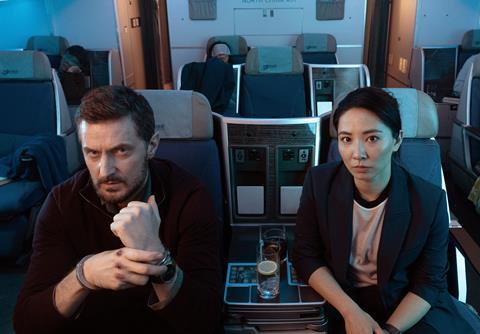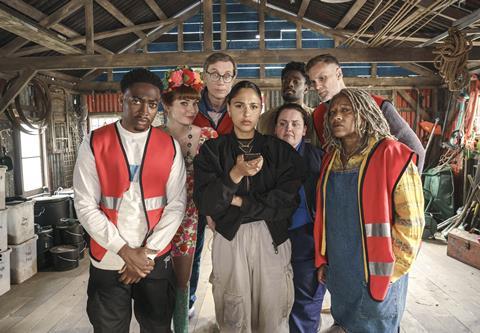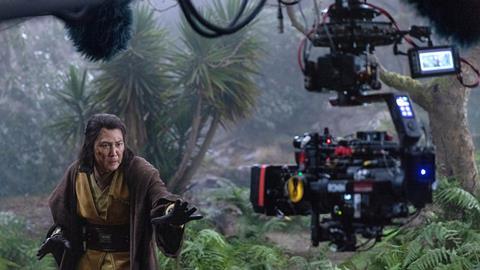As the number of productions seeking a home shrinks, studios are having to do more to win work than simply provide space, with environmental sustainability, community engagement and training programmes at the top of the agenda
At a basic level, film and TV studios exist to sell space. But in an increasingly competitive landscape, many are finding that is no longer enough. As they battle to attract a shrinking number of productions, studios are rethinking how they do business, and developing their offer in terms of training, community outreach and environmental sustainability.
“Operators are under more pressure to do the right thing,” says Garden Studios chief operating officer Bee Devine. “Studios have evolved into more of a creative hub to support productions. With that comes more responsibility – for instance, to minimise their carbon footprint on the local area.”
Fifteen years ago, TV studios were centred around London, while Pinewood and Shepperton dominated film production. But since 2013, when high-end TV (HETV) tax relief was introduced, demand has grown and stages have been popping up all over the country.
“When a new studio is built, it generates a huge amount of local interest in communities that have had no previous experience of anything like it,” says Shinfield Studios joint managing director Nick Smith. Based at the Thames Valley Science Park near Reading, the studio’s first four stages opened in 2022, and the last of its 18 stages became fully operational in April.
“You don’t just build a massive studio in what is a small parish without involving the community,” says Smith. “You have to bring the community with you.”
Keeping local councils and public opinion on side is especially important if the business wants to expand. “Because studios have a disproportionately large footprint within the community, people perceive them to be bigger businesses than they actually are,” says Dock 10 head of studios Andy Waters. “People look to you to set the standard for the community.”
“We have social values at our core. Being good citizens runs through us like a stick of rock”
Laura Aviles, The Bottle Yard Studios
For Bristol’s The Bottle Yard Studios, this is even more crucial – the facility is owned by Bristol City Council, meaning “we have social values at our core”, says head of film Laura Aviles. “Being good citizens runs through us like a stick of rock.”
Imperative for the survival of any studio, especially those outside London, is building and sustaining a base of freelance crew and permanent staff to serve production. To support its expansion from eight to 11 stages in 2022, The Bottle Yard employed an outreach co-ordinator to cement relationships with the West of England Combined Authority and the metro mayor Dan Norris, and who was tasked with “stressing how beneficial HETV production is to the region and the local population”, says Aviles.

A £300,000 award from the council helped to establish a workforce development programme, specifically targeting under-represented groups. To date, 45 people have completed the five-week course, which aims to have people ‘set-ready’ and equipped to take on work as a freelancer.
“One goal is to dispel myths about the industry,” says Aviles, adding that the course also includes advice on topics such as completing tax returns and managing potential workplace harassment. “For us, it’s about pastoral support as well.”
The studio also offers affordable stages to lowerbudget indie features or children’s productions, which would struggle to find space anywhere else. This is about more than benefiting the production, Aviles says: “Those productions are actually the training grounds for the directors and HoDs of the future.”
Shinfield, the University of Reading and Slough-based Resource Productions have partnered to develop a Berkshire-based ‘Skills Cluster’ backed by £600,000 of BFI funding. The scheme, part of a nationwide initiative, aims to create opportunities for new entrants to the workforce, those from underrepresented backgrounds, individuals upskilling and over-50s jobseekers returning to work.
“We’re working with local education establishments, careers advisers and job centres to showcase the variety of job opportunities,” says Shinfield head of marketing Julia Hillsdon. “A lot of the outreach is about managing perceptions of what goes on in a studio on a day-to-day basis, showing it as a working environment and not one that’s all glamour.”
Work simulation
As part of the government’s sector-based work academy programme (SWAP), Shinfield simulated the experience of filming on set for a group of jobseekers. Its workforce development programme, which began in January, works with producers to secure work experience placements for graduates on shows such as The Road Trip, produced by 42 for Paramount+. It also seeks out talent through its partners – graduates of a camera lighting and grip course run by kit rental house MBS have landed permanent jobs at the studio.
Cardiff-based Bad Wolf is unusual in being an indie that runs its own studio. Chief executive Jane Tranter explains: “I wanted to do the opposite of normal filming, where you helicopter into a region, spend lots of money temporarily, then heli out again, leaving tumbleweed. Instead, we committed to invest in Bad Wolf Studios and to try to provide jobs for the community 52 weeks a year.”
“It’s a virtuous circle where what we put into the local economy in terms of training and education deepens the pool we are able to draw on”
Jane Tranter, Bad Wolf Studios
In 2018, Bad Wolf began working with Screen Alliance Wales as an outreach partner. It has since delivered more than 3,000 studio visits, more than 15,000 online masterclasses, 405 work shadowing placements and 117 long-term paid traineeships.
“It’s a virtuous circle where what we put into the local economy in terms of training and education deepens the pool we are able to draw on,” says Tranter.

To this end, Bad Wolf Studios regularly hosts school children from the age of nine at a permanent classroom on site. “I don’t know of any [other] proprietor that would put in a classroom when they could rent the space,” Tranter says. “Production jobs can feel a bit smoke and mirrors, so this is about explaining the scope and scale of opportunities.”
Diversity and the environment are also key issues. Studios are actively hiring a diverse workforce, including those who are neurodivergent or have a disability. Many studios – Shinfield, Bad Wolf and The Bottle Yard included – are working with the TV Access Project to ensure buildings are as accessible and inclusive as possible. While adapting older studios – for example, by widening corridors – can be costly, new builds are being designed with access in mind.
Meanwhile, productions are becoming “increasingly vocal about wanting to work with studios that align with their sustainable values”, according to a report from Bafta’s climate and sustainability arm, Albert.

Waters agrees. When Dock 10 opened in 2011, most customer questions on sustainability were about completing paperwork and forms. “Today, our employees and our customers’ employees are much more aware of the environment and want to ensure that everything is being done to minimise environmental impact,” he says. “Customers want to know that it’s more than just ‘talk’.”
Dock 10 boasts a net carbon-neutral building, has planted 5,000 trees in the Brazilian rainforest, and achieved ISO standards for environment and energy management. It has also partnered with the Lancashire Wildlife Trust on a project to preserve peat bogs.
The number of studios signing up to Albert’s Studio Sustainability Standard is 29, up from 12 in its first year in 2022, but the scheme remains voluntary.
Waters says this breeds confusion. “There isn’t a requirement from broadcasters for all facilities to have these standards,” he says. “There isn’t one agreed standard that everyone can point to that says, ‘We meet sustainability criteria so your production can come here’.”
Other studio chiefs agree that the Albert scheme should be mandatory. “Our industry is heavily industrialised and we should all have to work super hard to offset that where we can,” says Tranter. “We take part in Albert to hold our feet to the fire.”
IMG operates four studios at Stockley Park near
Heathrow powered by 100% renewable energy – including one exclusively for Premier League
Productions. Its Bafta Studio Sustainability rating rose two points to 81% in 2023. “It helps us to keep focused, train our engineers to look for sustainable replacement technology and as ammunition to inform senior leadership about new initiatives,” says IMG production exec Sarita Neto.
Sustainability criteria has been included in production tenders for years, but Neto says the scope, detail and weighting in terms of importance is increasing. “Customers are slowly starting to move away from suppliers who cannot demonstrate their roadmap to net zero.”
Sustainability initiatives
The Bottle Yard’s green credentials helped Bristol win the 2024 City of Film Award from Broadcast’s sister publication Screen. The studios’ roof is equipped with a one megawatt solar array that generates enough power to offset the site’s annual carbon output. Generated power is also fed back into the local electricity grid.
“We are getting increased inquiries and securing more work because of our sustainability initiatives,” says business and operations manager Katherine Nash. Engagement with productions on waste management is just as important as solar power, she notes.
Garden Studios in north-west London is one of only two studios in the world – Vancouver Film Studios is the other – to have achieved B Corp Certification, which measures social and environmental impact on employees and society.
“We have gone through meticulous assessment in every facet of our business, from employee benefits to charitable giving and supply chain practices,” says Devine.
Among these initiatives, it works with ReCollective, a charity that upcycles production materials and provides carbon data for Albert certification.

Garden Studios also partners with Panalux and other businesses on its Park Royal campus to support work placements. It launched The Hive last summer to offer small businesses a space that combines co-working support and creative production suites. MAMA Youth Project, a provider of training and support to young media talent, has been resident since the beginning of the year.
Equally refreshing, studios are now budgeting for wellbeing co-ordinators, diversity recruiters and sustainability co-ordinators within productions.
“An Albert certificate is almost mandatory for scripted drama but what is encouraging is that the culture of production has shifted to include skills,” says Nash. “We have clients lobbying us to tell them how we can help them fulfil their strategic goals in these areas.”
































No comments yet